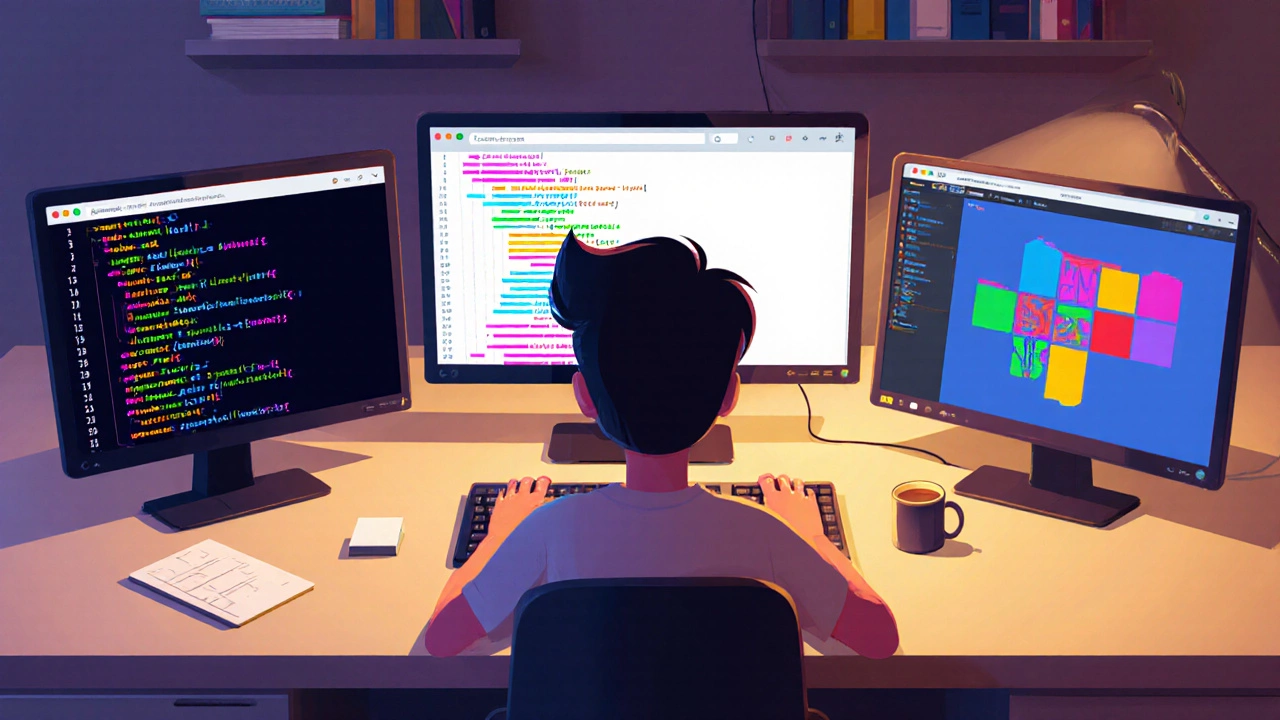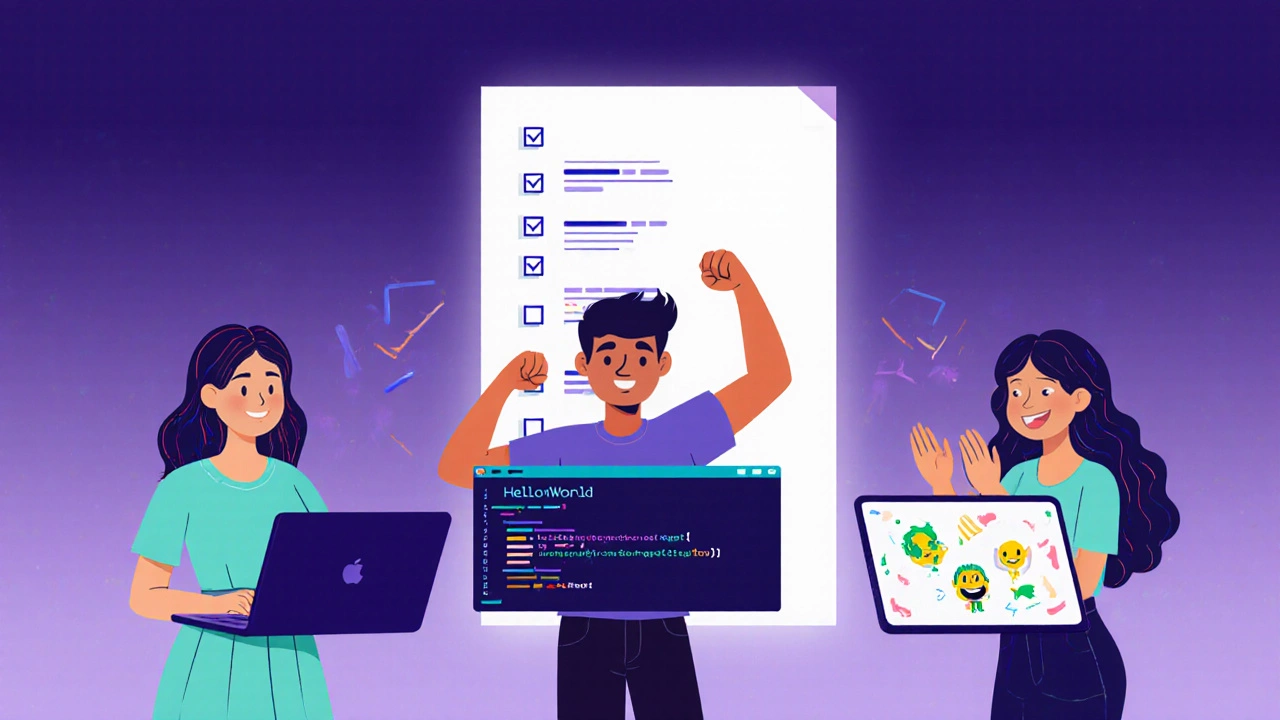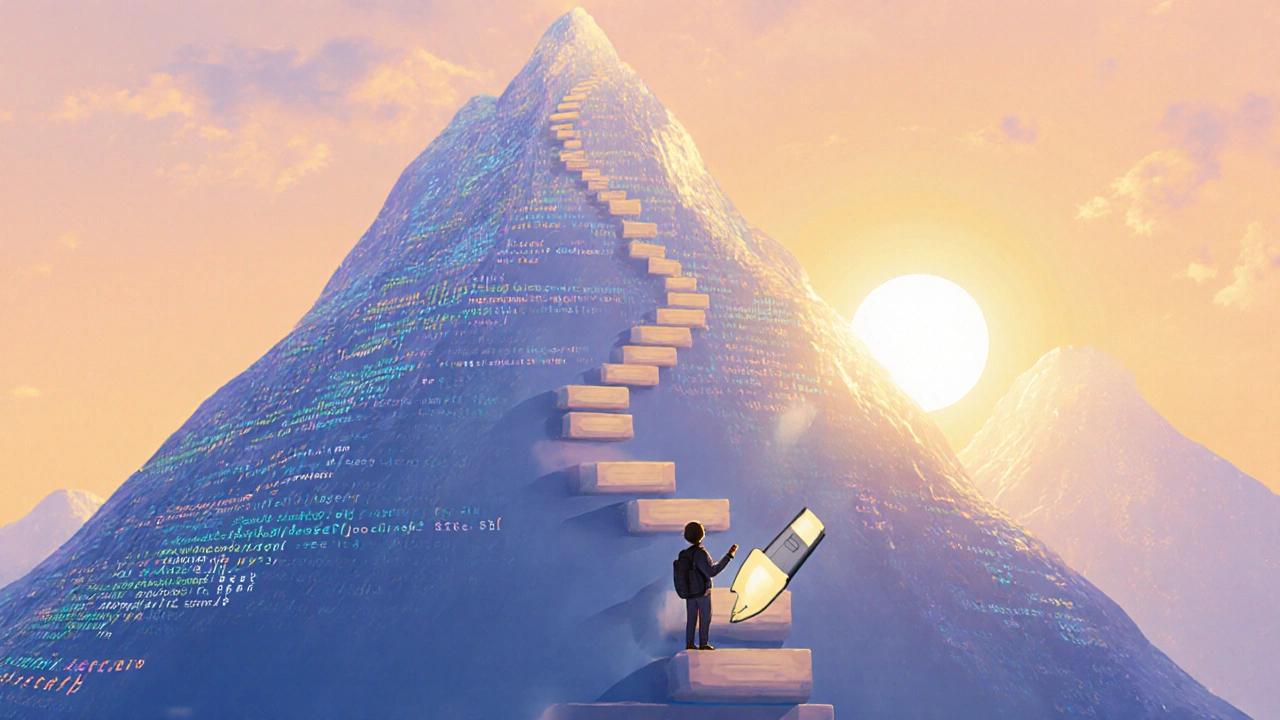When you hear the word coding - writing instructions that a computer follows -, you might wonder if it’s a mountain too steep for a newcomer. Here’s the plain answer for anyone coding for beginners who doubts themselves: it’s not impossible, it’s just new. The brain simply needs time to rewire, and the right tools can make the climb feel like a stroll.
Why the "hard" myth sticks around
Most people picture a sea of cryptic symbols, endless error messages, and a need for a PhD in math. Those images come from movies, old textbooks, or the first time they tried to write a line of code without any guidance. The myth thrives because:
- Early exposure often happens with obscure languages that hide friendly syntax.
- Self‑study can feel lonely; without a community, a tiny mistake feels like a wall.
- Media glorifies prodigies, making the average learner think they must be a genius.
Understanding where the fear originates helps you strip it away.
Common hurdles beginners face
Every new coder hits a few predictable bumps. Recognising them early means you can jump over them instead of stumbling.
- Syntax errors mistakes in the way code is written, like missing commas or brackets. They are frustrating but harmless; the computer just can’t read the instructions.
- Algorithmic thinking breaking a problem into step‑by‑step instructions. It feels like solving a puzzle you’ve never seen before.
- Debugging the process of finding and fixing bugs. It can seem endless, but it’s really just detective work.
- Information overload - dozens of tutorials, tools, and jargon can leave you staring at a screen with no idea where to start.
Knowing these points lets you prepare a toolbox of strategies.
Pick a friendly first language
Choosing the right language is like picking a comfortable pair of shoes for a long walk. Below is a quick comparison of three languages that many beginners swear by.
| Language | Readability | Typical use | Community size | Learning curve |
|---|---|---|---|---|
| Python high‑level, text‑based language | Very high - clear English‑like syntax | Web apps, data science, automation | Large - millions of tutorials | Gentle |
| JavaScript language of the web | Medium - some quirks but essential for browsers | Interactive websites, front‑end development | Massive - huge ecosystem | Moderate |
| Scratch visual block‑based language | Very high - drag‑and‑drop blocks | Introductory projects, games, animations | Strong - especially in schools | Very gentle |
If you love reading plain English, start with Python. Want to see instant results in a web browser? JavaScript is the way. If you prefer to avoid typing code altogether at first, try Scratch.

Join the right learning environment
Learning alone can be intimidating. Online coding classes structured courses delivered over the internet give you a schedule, a teacher, and a community. Look for courses that:
- Start with fundamentals, not jargon.
- Offer hands‑on projects after each lesson.
- Provide a forum or chat where you can ask questions.
- Include a mentor or teaching assistant for quick feedback.
Platforms like Codecademy, freeCodeCamp, and Coursera have beginner tracks that match these criteria.
Build good habits from day one
Habits shape progress more than raw talent. Here are three practices that turn frustration into fuel.
- Write small, runnable snippets. Instead of typing a whole program, start with a single line that prints ‘Hello’. This gives instant feedback and reduces fear of breaking things.
- Debugging systematically locating errors as a routine: read the error message, locate the line, add a print statement, and test again.
- Use a code editor software that helps write code with syntax highlighting with auto‑completion (e.g., VS Code). It catches many syntax mistakes before you even run the code.
These habits make learning feel like a series of small wins.

Real‑life stories that prove it’s doable
Stories matter. Meet three people who started with zero experience and now write code for a living:
- Alice, 34, Oxford - She enrolled in a weekend Python beginner course to automate her school’s admin work. Within six months she built a web‑app that saved the staff 10 hours a week.
- Ravi, 22, Delhi - Started with JavaScript interactive tutorials to create a personal portfolio site. Today he freelances for startups.
- Emma, 16, Manchester - Used Scratch visual blocks in school to make a game for a class competition. She’s now learning Python to develop mobile apps.
If they could do it, you can too-especially with a clear path.
Checklist for the beginner coder
- Pick one language and stick with it for at least 4 weeks.
- Set aside 30 minutes daily for practice.
- Complete a small project (e.g., a calculator, a to‑do list).
- Join an online forum or local meetup.
- Document errors and how you solved them - a personal bug‑log.
Cross items off as you go; the sense of progress is a huge motivator.
Next steps: Turn learning into a habit
Now that you know coding isn’t a secret club, decide on your first concrete action:
- Sign up for a free introductory online coding class that matches your chosen language.
- Install a code editor like Visual Studio Code and write your first “Hello World”.
- Join a community - Discord server, Reddit r/learnprogramming, or a local meetup.
- Pick a tiny project that solves a personal problem. Build, break, debug, repeat.
Remember, the difficulty lives in the unknown, not in the language itself. Keep the unknown small, and the journey stays easy.
Is any programming language easier than others?
Yes. Languages like Python and Scratch are designed with readability in mind, so they have a gentler learning curve than C++ or Java.
How long does it take to become comfortable with coding?
Most beginners feel confident after 3-4 months of consistent practice (30‑60 minutes daily). Mastery, however, takes years.
Do I need a computer science degree to code?
No. Many successful developers are self‑taught or attended bootcamps. What matters most is a portfolio of projects.
What’s the best way to overcome syntax errors?
Read the error message carefully, locate the line, and compare it with a working example. Using a code editor with syntax highlighting helps spot missing commas or brackets instantly.
Can I learn to code for free?
Absolutely. Platforms like freeCodeCamp, Khan Academy, and the official Python documentation offer high‑quality, zero‑cost resources.
